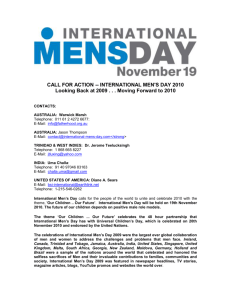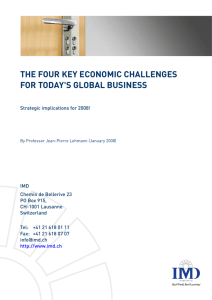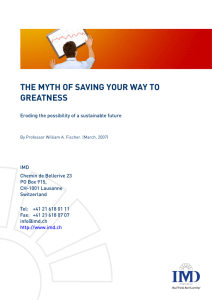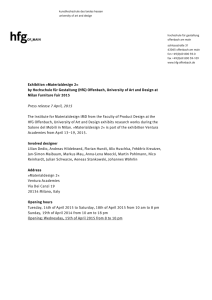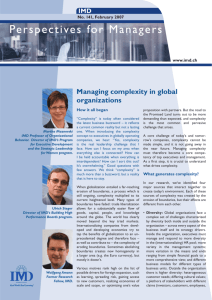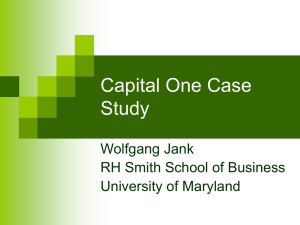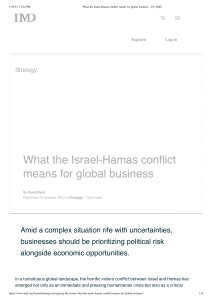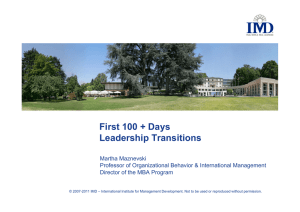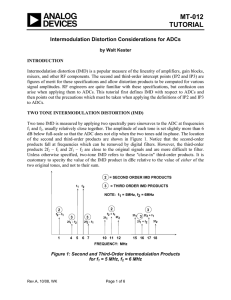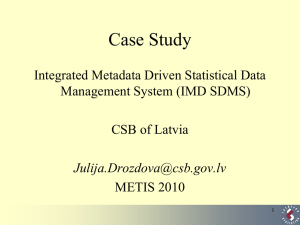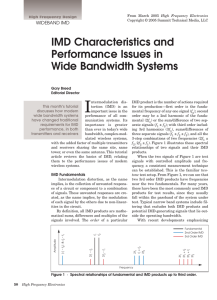TITLE OF THE PRESENTATION THAT RUNS OVER TWO LINES
advertisement
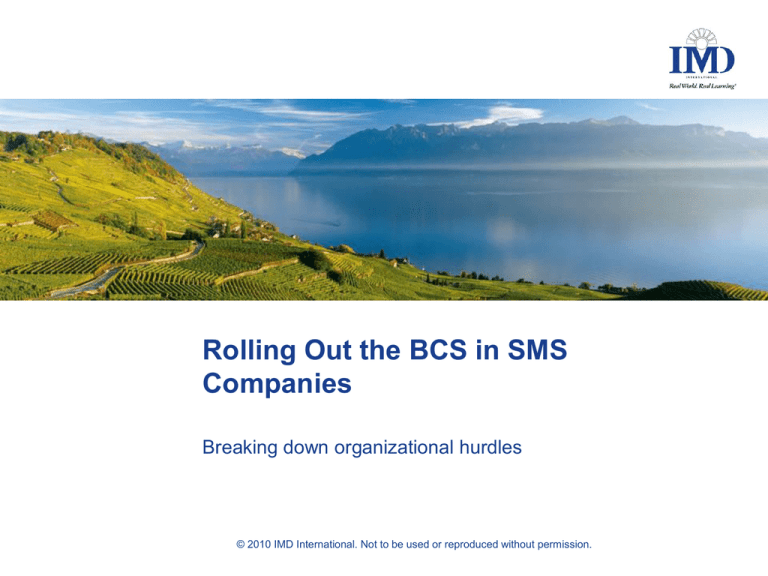
Rolling Out the BCS in SMS Companies Breaking down organizational hurdles © 2010 IMD International. Not to be used or reproduced without permission. Aligning organizations behind sustainability strategies are deterred by combined internal and external barriers. Ignorance/reluctance of key stakeholders (customers and financial markets) leading to An incremental approach Few radically innovative business models and products Perception amongst managers: “Laggards are punished but innovators are not rewarded” Internal barriers to corporate sustainability are prevalent Mindset Organizational culture Lack of appropriate processes and tools © IMD 2010 2 Ignorance/reluctance of key stakeholders (customers and financial markets) is perceived as the key external barrier. The more demanding stakeholders are about social and environmental issues, the more irrelevant for companies they are for companies (not the companies primary stakeholders) NGOs, consumer organizations lacked leverage to push companies toward more sustainable business models and products more rapidly © IMD 2010 3 2004: Organizational culture and manager’s mindset are the main barriers to roll out corporate sustainability Lack of interest from customers 16% Opposition or lack of interest from investors 8% Organizational culture 20% © IMD 2010 Other 4% Managers' mindset 19% Managers' lack of knowledge/expertise 14% Regulation (e.g. subsidies & low environmental/social standards) 7% Absence of appropriate tools and processes 12% N = 945 GM 4 2009: Global organizations are often frustrated getting things done in CSR Reported pain points of managing responsible value chains Engagement, change, reward • • Middle management buy-in • Short-term mindsets • Difficulties to integrate into business model • Organization silos • Difficulties to make the business case across departments and BUs • Knowledge CSM targets are not integrated within rewards and evaluation systems • Lack of systematic performance measurement and benchmarking Difficulties to build effective networks to support innovation • Barriers to transforming markets/educating customers, consumers • Lack of quantification tools of specific business cases and emerging risks • Lack of adequate KPIs Resource leverage • Poor cost effectiveness of green/responsible procurement • Difficulties to push energy/resource savings to the next level • High cost of innovation • Low impact on brand leverage Responses from 22 global organizations participating in IMD’s Forum for Corporate Sustainability Management – April 2009 © IMD 2010 5 Internal barriers to sustainable agriculture are prevalent in the food & beverage industry The greatest challenge? Breaking down mindsets of managers and filling knowledge gaps about the significant industry threats and business risks of unsustainable agriculture © IMD 2010 6 SAI meeting - April 2009 Hurdles at the company level Lack of systematic performance measurement Non buy-in by supply chain and purchasing officers Difficulties in making SA goals a line responsibility Rew ard systems do not incorporate sustainability Lack of managerial know ledge/know how to implement Lack of access to SA know ledge Difficulties in identifying new business/product innovation Lack of a high profile for SA w ithin the organization Lack of professional SA management along the supply-chain Fixed or short-term managerial mindsets: marketing/sales Disinterest/opposition from shareholders Lack of access to appropriate netw orks Fixed or short-term managerial mindsets: supply chain/ Fixed or short-term managerial mindsets: finance Disinterest/opposition from our customers Lack of informed stakeholder dialogue Non buy-in by finance managers 0 © IMD 2010 5 10 15 20 25 30 35 7 SAI meeting – April 2009 Hurdles at the farm level Lack of aw areness/know ledge Lack of technical support Inappropriate policy scheme Lack of financial means/access to credit SA needs to be “sold” to suppliers Lack of demand from customers 0 © IMD 2010 5 10 15 20 25 30 35 8 CSM research on greening Chinese business 2003 – Study of managerial perceptions in 300 Chinese companies SIGNIFICANT IMPACTS: 70% of environmental managers admitted moderate to heavy impact of corporate activities on the environment LOW AWARENESS: Environmental Managers reported low awareness amongst colleagues of environmental/social impacts LACK OF KNOWLEDGE/EXPERTISE: Apart from lack of capital, lack of managerial expertise (not so much technical) DELAYS IN UPGRADING TECHNICAL EQUIPMENT: owing to lack of capital but also potential unemployment threats, thus implications for social stability ENFORCEMENT: Regulation putting environment on the radar screen but enforcement and lack of expertise in ensuring enforcement lacking REACTIVE: Government perceived as primary stakeholder therefore attitudes remained reactive. Few beyond compliance, pioneering activities © IMD 2010 9 Promoting factors for corporate sustainability Open organizational culture Other 2% 1% Individual stakeholder and institutional investor demands 8% Corporate values 11% Autonomy and internal scope 1% Top management commitment & leadership 23% Public pressure 16% Increased competition on environmental and social issues in industry 10% New business opportunities 11% Process and product innovations 8% Dialogue with stakeholders 9% © IMD 2010 N = 123 SO 10 Business functions Primary deterring role NR or N/A or Do not Know 20% R&D 4% Potential promoting role Top Management 1% Manufacturing 13% Finance/Control 4% Other 2% Marketing/Sales 14% HR & Corp Staff 10% No Opposition 7% Other 5% Marketing/Sales 13% Finance/Control 28% HR & Corp Staff 30% EHS/Sustainability 1% R&D 25% Manufacturing 23% N = 2068 © IMD 2010 11 Workshop challenge – breaking down organizational hurdles What are the organizational hurdles currently deterring SMEs from effectively rolling out sustainability initiatives? © IMD 2010 12

